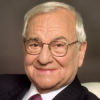Lee Iacocca

Lee Iacocca
Lido Anthony "Lee" Iacoccais an American automobile executive best known for spearheading the development of Ford Mustang and Pinto cars, while at the Ford Motor Company in the 1960s, and then later for reviving the Chrysler Corporation as its CEO during the 1980s. He served as President and CEO of Chrysler from 1978 and additionally as chairman from 1979, until his retirement at the end of 1992...
NationalityAmerican
ProfessionEntrepreneur
Date of Birth15 October 1924
CityAllentown, PA
CountryUnited States of America
The biggest mistake in my life was hiring Eaton as chairman without checking him out first, ... I didn't know him and hired the wrong guy, an error of judgment. When you make a bad people choice it hurts a lot of people for a long time.
People say to me, ''You were a roaring success. How did you do it?'' I go back to what my parents taught me. Apply yourself. Get all the education you can, but then, by God, do something. Don't just stand there, make something happen.
Talk to people in their own language. If you do it well, they'll say, 'God, he said exactly what I was thinking.' And when they begin to respect you, they'll follow you to the death.
People want economy and they will pay any price to get it.
Here's what management is about: Pick good people and set the right priorities.
People want economy, and they'll pay any price to get it.
Any supervisor worth his salt would rather deal with people who attempt too much than with those who try too little.
The kind of people I look for to fill top management spots are the eager beavers, the mavericks. These are the guys who try to do more than they're expected to do - they always reach.
Talk to people in their own language. If you do it well, they'll say,"God, he said exactly what I was thinking." And when they begin to respect you, they'll follow you to the death.
I've got to get stop getting fired like this. People will start to think I'm a drifter.
In the end, all business operations can be reduced to three words: people, product, and profits.
I hire people brighter than me and then I get out of their way.
I was fortunate to get a scholarship when I went to Lehigh University and Princeton. They were both wonderful schools. Somebody was kind enough to spend their money to educate people that they would never get to know. That's what I think philanthropy is about.
A major reason capable people fail to advance is that they don't work well with their colleagues.